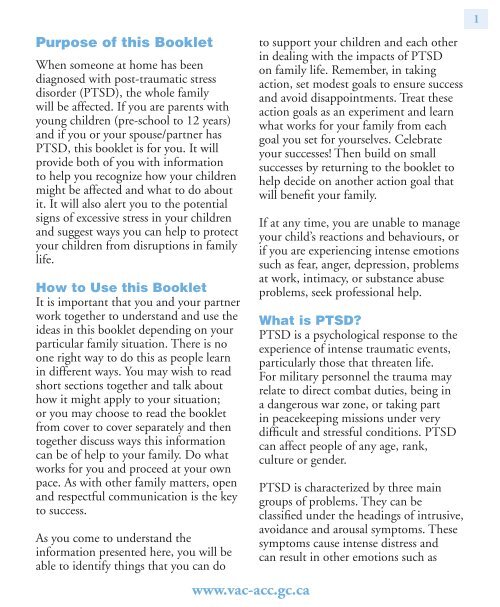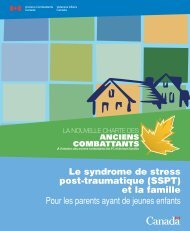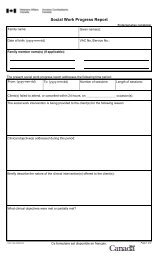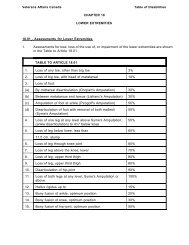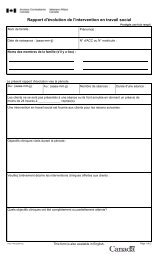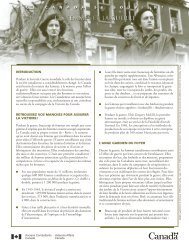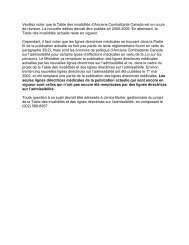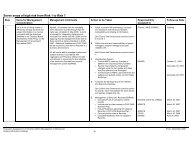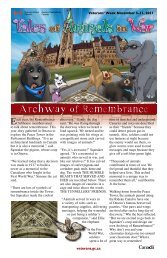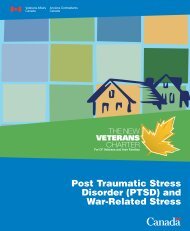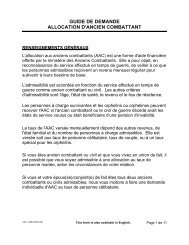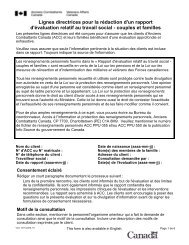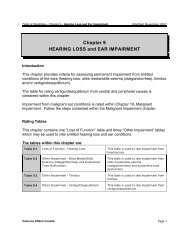Post-Traumatic Stress Disorder (PTSD) and the Family for Parents ...
Post-Traumatic Stress Disorder (PTSD) and the Family for Parents ...
Post-Traumatic Stress Disorder (PTSD) and the Family for Parents ...
You also want an ePaper? Increase the reach of your titles
YUMPU automatically turns print PDFs into web optimized ePapers that Google loves.
Purpose of this Booklet<br />
When someone at home has been<br />
diagnosed with post-traumatic stress<br />
disorder (<strong>PTSD</strong>), <strong>the</strong> whole family<br />
will be affected. If you are parents with<br />
young children (pre-school to 12 years)<br />
<strong>and</strong> if you or your spouse/partner has<br />
<strong>PTSD</strong>, this booklet is <strong>for</strong> you. It will<br />
provide both of you with in<strong>for</strong>mation<br />
to help you recognize how your children<br />
might be affected <strong>and</strong> what to do about<br />
it. It will also alert you to <strong>the</strong> potential<br />
signs of excessive stress in your children<br />
<strong>and</strong> suggest ways you can help to protect<br />
your children from disruptions in family<br />
life.<br />
How to Use this Booklet<br />
It is important that you <strong>and</strong> your partner<br />
work toge<strong>the</strong>r to underst<strong>and</strong> <strong>and</strong> use <strong>the</strong><br />
ideas in this booklet depending on your<br />
particular family situation. There is no<br />
one right way to do this as people learn<br />
in different ways. You may wish to read<br />
short sections toge<strong>the</strong>r <strong>and</strong> talk about<br />
how it might apply to your situation;<br />
or you may choose to read <strong>the</strong> booklet<br />
from cover to cover separately <strong>and</strong> <strong>the</strong>n<br />
toge<strong>the</strong>r discuss ways this in<strong>for</strong>mation<br />
can be of help to your family. Do what<br />
works <strong>for</strong> you <strong>and</strong> proceed at your own<br />
pace. As with o<strong>the</strong>r family matters, open<br />
<strong>and</strong> respectful communication is <strong>the</strong> key<br />
to success.<br />
As you come to underst<strong>and</strong> <strong>the</strong><br />
in<strong>for</strong>mation presented here, you will be<br />
able to identify things that you can do<br />
www.vac-acc.gc.ca<br />
to support your children <strong>and</strong> each o<strong>the</strong>r<br />
in dealing with <strong>the</strong> impacts of <strong>PTSD</strong><br />
on family life. Remember, in taking<br />
action, set modest goals to ensure success<br />
<strong>and</strong> avoid disappointments. Treat <strong>the</strong>se<br />
action goals as an experiment <strong>and</strong> learn<br />
what works <strong>for</strong> your family from each<br />
goal you set <strong>for</strong> yourselves. Celebrate<br />
your successes! Then build on small<br />
successes by returning to <strong>the</strong> booklet to<br />
help decide on ano<strong>the</strong>r action goal that<br />
will benefit your family.<br />
If at any time, you are unable to manage<br />
your child’s reactions <strong>and</strong> behaviours, or<br />
if you are experiencing intense emotions<br />
such as fear, anger, depression, problems<br />
at work, intimacy, or substance abuse<br />
problems, seek professional help.<br />
What is <strong>PTSD</strong><br />
<strong>PTSD</strong> is a psychological response to <strong>the</strong><br />
experience of intense traumatic events,<br />
particularly those that threaten life.<br />
For military personnel <strong>the</strong> trauma may<br />
relate to direct combat duties, being in<br />
a dangerous war zone, or taking part<br />
in peacekeeping missions under very<br />
difficult <strong>and</strong> stressful conditions. <strong>PTSD</strong><br />
can affect people of any age, rank,<br />
culture or gender.<br />
<strong>PTSD</strong> is characterized by three main<br />
groups of problems. They can be<br />
classified under <strong>the</strong> headings of intrusive,<br />
avoidance <strong>and</strong> arousal symptoms. These<br />
symptoms cause intense distress <strong>and</strong><br />
can result in o<strong>the</strong>r emotions such as


